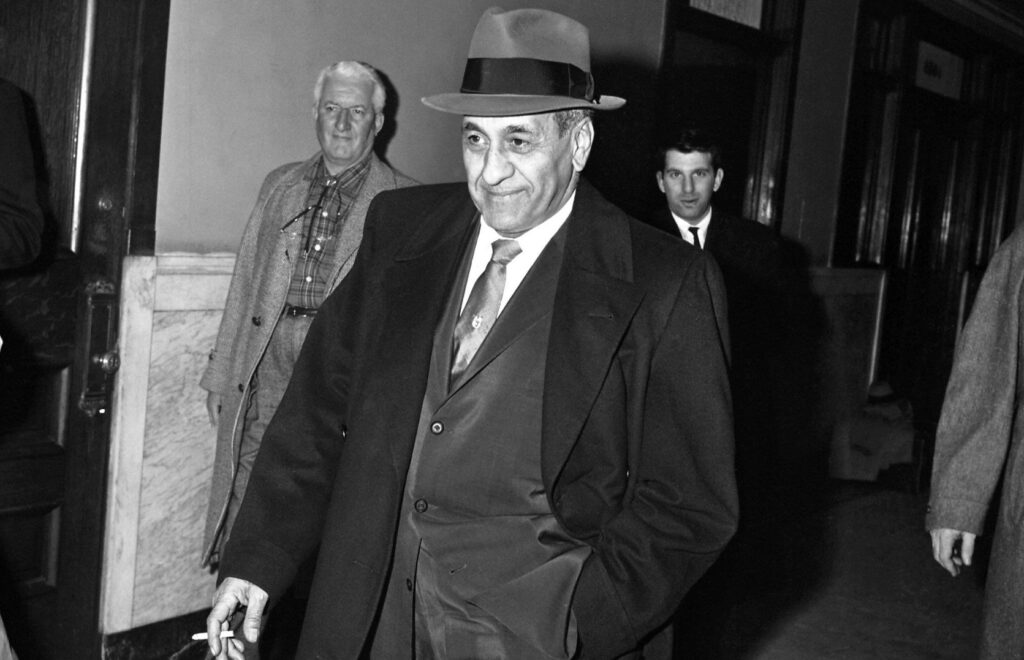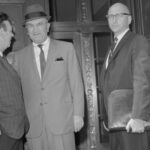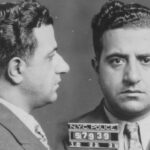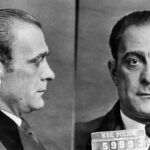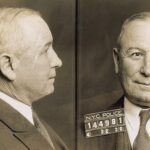Tony Accardo’s story is not just a narrative of crime; it’s a complex saga that mirrors the evolution of organized crime in America. While Al Capone’s flamboyant lifestyle and notorious exploits have captured public imagination, Accardo’s reign was characterized by a strategic, behind-the-scenes manipulation that proved far more effective and enduring. His life is a compelling case study in the power of intellect and discretion over brute force in the criminal underworld. Accardo’s ability to navigate the treacherous waters of organized crime without succumbing to the pitfalls that ensnared many of his contemporaries is a testament to his unique approach to leadership and survival.
In the world of mobsters, where notoriety often equates to a target on one’s back, Accardo’s choice to operate in the shadows was a masterstroke. It allowed him to build and control a criminal empire that was both resilient and adaptable, navigating the changing landscapes of law enforcement and inter-gang dynamics. His story is not just about the crimes he committed or the power he wielded; it’s about the mind of a man who understood the value of being a ghost in a world full of loud specters.
Early Life – The Making of a Mobster
Antonino Leonardo Accardo’s early life in the Sicilian enclave of Chicago set the stage for his future as a formidable figure in the Chicago Outfit. Born into a world where survival often meant bending the rules, Accardo’s childhood was steeped in the realities of street life. The environment of his upbringing was a melting pot of cultures and influences, with a strong undercurrent of the Sicilian code of honor and loyalty, elements that would later define his approach to organized crime.
Accardo’s foray into the world of crime began with small-time delinquencies, a common path for many youths in his neighborhood. These early experiences in the streets of Chicago were more than just a descent into criminality; they were a formative journey that honed his instincts for survival and power. The young Accardo quickly learned the importance of alliances and the art of navigating the complex social hierarchies of the streets.
This period of his life was crucial in shaping his understanding of the dynamics of power and control. The lessons learned in these formative years went beyond the mechanics of criminal activities; they imbued in him a deep understanding of human nature, the importance of strategic thinking, and the ability to anticipate and outmaneuver opponents. These skills would later become the cornerstone of his leadership style and the key to his longevity in the treacherous world of organized crime.
Accardo’s transition from small-time delinquent to a respected member of the Chicago Outfit was not just a change in scale; it was a metamorphosis that saw the emergence of a criminal mastermind. His early life’s experiences laid the groundwork for what would become one of the most influential and enduring careers in the history of American organized crime.
Ascension in the Mafia Ranks
Meeting Al Capone
The encounter between Tony Accardo and Al Capone in the mid-1920s was a defining moment in the annals of organized crime. This meeting was not merely a chance interaction but a confluence of ambition and opportunity. Accardo, then a young man in his early twenties, found himself in the orbit of Capone, the era’s most infamous gangster. This pivotal moment marked the beginning of Accardo’s ascent in the criminal hierarchy, a journey that would see him evolve from a street-level enforcer to a mastermind of organized crime.
Capone, known for his keen eye for talent, quickly recognized Accardo’s potential. The young Accardo displayed a blend of raw street smarts and a sharp intellect, qualities that were invaluable in the volatile world of the mafia. His induction into the Chicago Outfit was more than just an entry into a criminal organization; it was an initiation into a world where power, loyalty, and brutality were the currencies of survival and success.
Role and Reputation
Accardo’s role in Capone’s organization was multifaceted. As a chauffeur and bodyguard, he was not merely an employee but a trusted confidant, privy to the inner workings of Capone’s empire. His position required a delicate balance of aggression and restraint, qualities that Accardo possessed in abundance. He was more than muscle; he was a strategist, playing a crucial role in the planning and execution of the Outfit’s operations.
The moniker “Joe Batters” was not just a nickname but a symbol of Accardo’s reputation for violence. This reputation was a crucial asset in the brutal world of the mafia, where respect was often garnered through displays of strength and ruthlessness. Accardo’s propensity for violence, however, was always strategic, never gratuitous. He understood that in the world of organized crime, brutality was a tool, not a pastime.
Accardo’s rise through the ranks was meteoric, but it was not accidental. It was the result of a rare combination of physical toughness, mental acuity, and an innate understanding of the complex dynamics of power. His loyalty to Capone was unwavering, but it was not blind. Accardo knew that in the mafia, alliances were fluid, and survival depended on the ability to adapt and evolve. His time with Capone was not just a phase in his career; it was a masterclass in the art of organized crime.
In the shadow of Capone, Accardo honed his skills, absorbing lessons that would later enable him to build and lead his own criminal empire. He observed the pitfalls that eventually led to Capone’s downfall and learned the importance of discretion and the dangers of overexposure. These lessons were not lost on Accardo, who would later apply them with remarkable effectiveness.
The relationship between Capone and Accardo was more than that of a boss and his subordinate; it was a mentorship that shaped the future of the Chicago Outfit. Accardo’s time with Capone laid the groundwork for his future, a future where he would not just participate in but shape the course of organized crime in America.
The Reign of Tony Accardo
Steering the Chicago Outfit
The era following Al Capone’s imprisonment marked a significant shift in the Chicago Outfit’s trajectory, primarily due to Tony Accardo’s leadership. Accardo’s approach to running the Outfit was markedly different from Capone’s. He was not just a successor; he was a reformer and a visionary. Under his guidance, the Outfit expanded its operations, delving into more sophisticated and less conspicuous forms of criminal enterprise, such as gambling and bookmaking. These ventures were not only profitable but also offered a lower profile, aligning perfectly with Accardo’s strategy of operating beneath the radar of law enforcement.
Accardo’s leadership was characterized by a shrewd understanding of the changing landscape of organized crime. He recognized the need for the Outfit to diversify its activities and sources of income. Gambling and bookmaking were lucrative, but they were also gateways to other forms of revenue, such as loan sharking and money laundering. Accardo’s ability to foresee and adapt to the evolving nature of criminal activities was a testament to his astuteness as a leader.
Under Accardo, the Chicago Outfit grew in both power and reach. He expanded its influence beyond the traditional territories of Chicago, establishing connections and alliances that extended across the United States. This expansion was not just geographical; it was also institutional. Accardo understood the importance of infiltrating legitimate businesses and political circles, thereby providing the Outfit with a veneer of legitimacy and additional layers of protection from law enforcement.
A Contrast to Capone
Tony Accardo’s leadership style stood in stark contrast to that of his predecessor, Al Capone. Where Capone had courted publicity and reveled in his status as a public figure, Accardo preferred to operate from the shadows. This preference for anonymity was not born out of timidity but was a strategic choice that allowed him to maintain control without attracting undue attention.
Accardo’s low profile was a deliberate and calculated move to ensure the longevity of both his leadership and the Outfit’s operations. He avoided the flamboyance and ostentation that had been Capone’s hallmark, understanding that such a lifestyle was a magnet for law enforcement scrutiny. Accardo’s discretion allowed him to navigate the treacherous waters of organized crime with a degree of insulation from the legal challenges that plagued many of his contemporaries.
This approach to leadership was revolutionary in the world of organized crime. Accardo’s ability to maintain a low profile while effectively managing a vast criminal empire was a testament to his unique blend of intelligence, foresight, and discipline. He eschewed the short-term gains of high-profile criminal activities in favor of long-term stability and growth. This strategic vision was instrumental in the Chicago Outfit’s enduring success and influence.
Accardo’s tenure as the head of the Chicago Outfit was not just a period of leadership; it was an era of transformation. He redefined the very nature of the organization, turning it into a more sophisticated, diversified, and resilient entity. His legacy is not defined by the crimes he committed but by the profound impact he had on the structure and operations of organized crime in America. Under Accardo’s stewardship, the Chicago Outfit became a model of criminal efficiency and adaptability, a legacy that would endure long after his departure from the scene.
Legal Tangles and Teflon Persona
Tony Accardo’s interactions with the law were a fascinating aspect of his long tenure in the criminal underworld. Despite being deeply involved in numerous illicit activities, his legal entanglements were remarkably minimal. This was not merely a stroke of luck but a result of his calculated approach to crime and his exceptional ability to remain under the radar. Accardo’s single night in jail stands as a testament to his cunning and caution, setting him apart from many of his contemporaries who frequently found themselves behind bars.
Accardo’s strategy involved a complex web of safeguards and precautions. He was known for his meticulous planning and for maintaining a network of connections that included corrupt officials and influential figures. This network played a crucial role in shielding him from legal consequences. Moreover, Accardo’s preference for operating in the background, away from the public eye, significantly reduced his chances of attracting law enforcement attention. His ability to remain a ghost in the system, despite his high-ranking status in the Chicago Outfit, was nothing short of remarkable.
The Tax Evasion Acquittal
The 1960s presented a significant challenge to Tony Accardo’s otherwise unblemished criminal record. He found himself in the crosshairs of the law, facing charges of tax evasion. This period was a critical test of Accardo’s strategic acumen and his network’s strength. The tax evasion charges threatened not just his freedom but also the stability of the Chicago Outfit.
However, in a turn of events that seemed almost characteristic of his criminal career, Accardo emerged from this legal battle unscathed. His acquittal after a retrial was a significant victory and served to reinforce his reputation as a Teflon figure in the world of organized crime. This outcome was not merely a result of legal maneuvering but also a reflection of Accardo’s deep understanding of the legal system and his ability to navigate it effectively.
The acquittal in the tax evasion case added another layer to Accardo’s already complex persona. It underscored his reputation as an untouchable figure in the criminal underworld, a man who could defy the odds and emerge victorious even when the stakes were high. This episode in his life further cemented his status as a legendary figure in organized crime, a status that would contribute to the enduring legacy of Tony Accardo in the annals of American criminal history.
Accardo’s ability to evade legal repercussions was a key factor in his prolonged dominance in the Chicago Outfit. It allowed him to focus on expanding and consolidating the Outfit’s power, free from the distractions and limitations that legal challenges would have posed. His Teflon persona was not just a testament to his individual capabilities but also a reflection of the sophisticated and well-oiled machine that was the Chicago Outfit under his leadership.
The Later Years – A Shadowy Puppeteer
In the twilight of his career, Tony Accardo transitioned into a role that was less conspicuous but no less influential. His ‘retirement’ in the late 1950s was a strategic repositioning rather than a withdrawal from the criminal world. As a consigliere, Accardo continued to exert substantial influence over the Chicago Outfit, orchestrating its activities with a masterful touch. His role during this period was akin to that of a chess grandmaster, moving pieces across the board with precision and foresight.
Accardo’s guidance during these years was crucial in navigating the Outfit through a rapidly changing landscape of organized crime. The post-war era brought new challenges and opportunities, and Accardo’s experience and wisdom were invaluable assets. He was a mentor to the new generation of mob leaders, imparting lessons learned from decades of navigating the treacherous waters of organized crime. His ability to adapt to changing times, to foresee and mitigate risks, ensured that the Outfit remained a dominant force in the criminal underworld.
This period of Accardo’s life was marked by a careful balance of power and discretion. He managed to maintain his authority and respect within the organization while keeping a low profile, a feat that few in his position had managed to achieve. His role as a consigliere was not just a title; it was a testament to his enduring influence and the respect he commanded within the Outfit and beyond.
Death and Enduring Legacy
Tony Accardo’s death on May 22, 1992, at the age of 86, marked the end of an era in the history of organized crime in Chicago. His passing was not just the loss of a former leader; it was the closing of a chapter in the story of the Chicago Outfit. Accardo’s life and career spanned the most tumultuous periods in the history of organized crime in America, and his influence was felt long after he stepped back from the front lines.
Accardo’s decision to keep the Chicago Outfit away from drug trafficking was a strategic choice that had far-reaching implications. This policy not only extended his life but also played a crucial role in maintaining the organization’s stability and integrity. In an era when many criminal organizations were destabilized by the lucrative but risky drug trade, Accardo’s foresight in avoiding this arena helped preserve the Outfit’s structure and strength.
The legacy of Tony Accardo is complex and multifaceted. He was a figure of contradiction – a ruthless mobster who was also a shrewd strategist, a violent enforcer who understood the value of discretion. His life story is a narrative of power, survival, and adaptation. Accardo’s impact on the Chicago Outfit and organized crime in America is indelible. He was not just a participant in the history of the mafia; he was one of its architects.
In the annals of organized crime, Tony Accardo occupies a unique position. His approach to leadership, his strategies, and his policies have become subjects of study for those interested in the workings of criminal organizations. His death marked the end of a personal era, but the legacy of his methods and leadership continues to influence the structures and strategies of organized crime today. Tony Accardo’s name may not be as widely recognized as some of his contemporaries, but his impact on the underworld is unquestionable.
Conclusion
Tony Accardo’s life story is not just a chronicle of a mob leader; it’s a study in the art of power, discretion, and survival in the treacherous world of organized crime. His legacy, though less flashy than Capone’s, is a testament to the effectiveness of a strategic and understated approach to leadership in the underworld.
Tony Accardo’s story is a rich narrative of a man who, through intelligence, strategic thinking, and an aversion to the limelight, carved a unique place for himself in the annals of organized crime. His life offers insights into the workings of the mafia and the qualities that define a successful leader in this clandestine and dangerous world.

